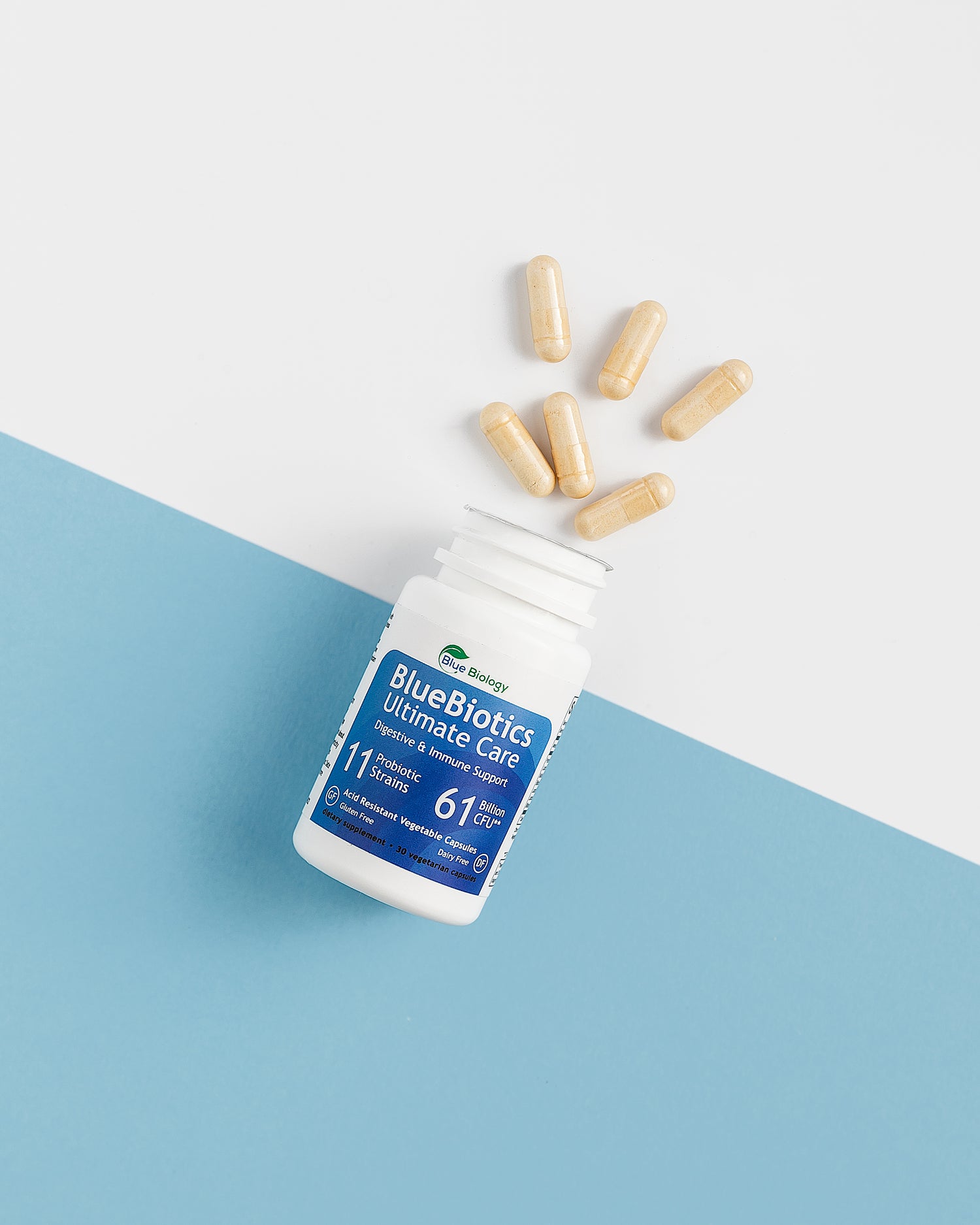
Probiotics are live bacteria that are good for your health, but they're best known for their ability to help maintain a healthy digestive system. While they do have widely-studied health benefits, they're also associated with a lot of things, including gas. If you’ve ever experienced an upset stomach or flatulence after taking a probiotic, you might be wondering, Is this really good for me? For this article, we took a look at whether this relatively common side effect is normal or if it should be cause for concern.
What are probiotics?
Probiotics are gut bacteria found naturally within your body’s gut flora, but also can be found in supplements formulated with freeze-dried microorganisms, often called “good” or “beneficial” bacteria. When taken regularly, probiotics help re-balance your gut bacteria or flora. They fight the “bad” or “harmful” bacteria that can overcrowd a person’s digestive system from things such as antibiotics, illness, travel, stress or inflammatory foods or alcohol. Flushing your system with a consistent stream of healthy gut bacteria has a variety of benefits because your gut health is so influential throughout other systems in the body.
What is gut flora (microbiome) and why is it important?
The average person has around 100 trillion bacteria within their digestive system, some of these bacteria are good (probiotics) and some bacteria are bad. These bacteria, along with other tiny organisms, are collectively referred to as gut flora or microbiome. The quality of your gut flora plays a huge role in regulating nutrient absorption, digestion, sleep, immune function, heart health and much, much more.
So, Do Probiotics Cause Gas and Bloating?
The short answer is that yes, some people do experience an increased amount of gas/bloating after taking probiotics. Gas is the bi-product of rapidly changing gut microbiota (gut bacteria). This is a temporary, but normal, side-effect and should clear up soon after beginning your new regimen.
When you take probiotics, you’re altering your gut flora. Anytime you make changes to this system (even good changes), it can lead to things like gas, bloating, and flatulence. Gas is a bi-product of changing gut bacteria.
Even though probiotics are good for you, you may have to endure a bit of discomfort in the beginning. Kind of like when you were a kid and your parents had to convince you to eat your vegetables or take your medicine. It may be uncomfortable at first, but you’re better off for it in the long run.
Some people don’t experience gas, bloating or any side effects at all from taking probiotics. Your experience may be different, and that’s OK. There are a wide range of reactions to probiotics that are completely normal. The good thing is that for those who do experience side effects from probiotics, they usually go away after taking them consistently for a few weeks.
What to do if Probiotics Cause Uncomfortable Side Effects like Gas
Check your probiotic supplement's label
Certain strains of probiotics have been well-researched for bloating. Some of these strains include:
- Lactobacullus acidophilus
- Bifidobacterium lactis
- Lactobacilus plantarum
- Saccharomyces boulardii
Take a prebiotic supplement.
Prebiotics are fibers that act as healthy fuel for probiotic bacteria. Prebiotics can be found in a lot of foods naturally, but not all prebiotic-containing foods help combat bloating.
When looking for a high-quality prebiotic supplement, look for one that contains a balance of FOS and GOS fibers & Alpha Galactose. Alpha Galactose is an enzyme that is well-known and effective for decreasing bloating. It’s the active ingredient in almost all anti-bloating supplements.
Check your diet & lifestyle.
Remember earlier when we mentioned that the condition of your microbiome affects other systems in the body? The same is true in reverse, meaning that all of your lifestyle choices can impact your gut health as well. Be sure you are eating a healthy & balanced diet, staying hydrated, decreasing stress in your life and getting enough exercise. Making good lifestyle decisions will not only help decrease bloating, but will also give your probiotic a better shot at working quickly and efficiently.
Get Moving
Your gut bacteria producing excess gas at some point in your life is inevitable whether you are taking probiotics or not. The discomfort with gas in the gut is when this gas becomes trapped.
You can help get this gas moving by being sure to keep active throughout the day. Walking, jogging, stretching, yoga & biking are fun, effective ways to sprinkle more exercise in your day-to-day routine.
The Bottom Line
If you get gas from taking probiotics, don’t worry too much. It may be uncomfortable for a short while during this initial adjustment period. The majority of people end up feeling back to normal within a few days and at most a few weeks. You have to give your body and digestive system time to adjust to the changes in your microbiome.
Gas is a by-product of changing gut bacteria and can become uncomfortable when it’s trapped in your gut. Be sure to keep this gas moving along by eating a healthy diet, drinking plenty of water, exercising & taking a high-quality prebiotic supplement containing Alpha Galactose.
Recommended Products:
BlueBiology Prebiotic Powder with (Alpha Galactosidase to combat bloating)
Sources:
https://pubmed.ncbi.nlm.nih.gov/29460487/
https://pubmed.ncbi.nlm.nih.gov/20208051/
https://pubmed.ncbi.nlm.nih.gov/29134359/
https://pubmed.ncbi.nlm.nih.gov/21436726/

